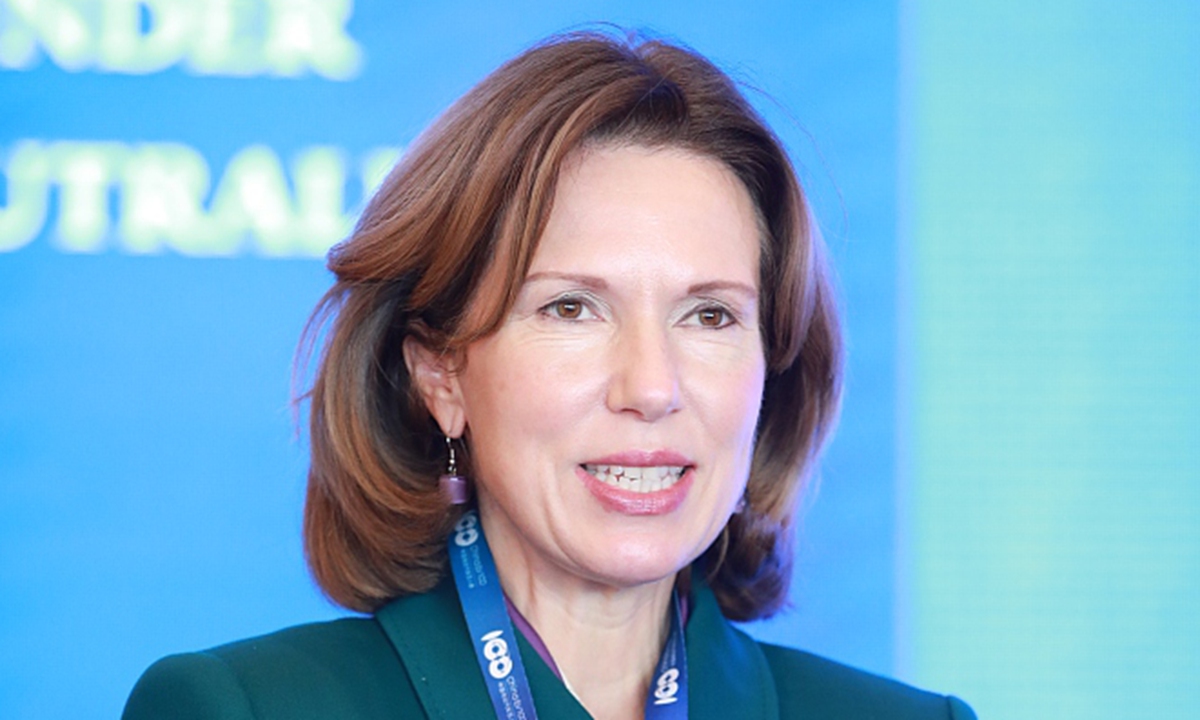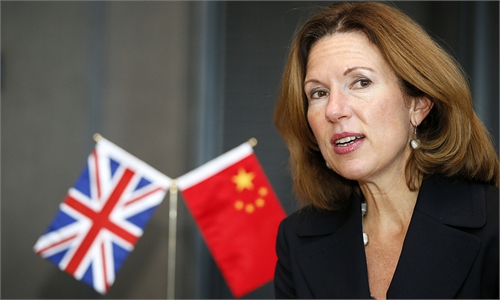
UK Ambassador to China Caroline Wilson Photo: VCG
UK Ambassador to China Caroline Wilson on Tuesday posted an article in Putonghua (standard Chinese), claiming that the international media's criticism of China is not China hating. Foreign media are being distortedly reported in China, and this obscures their positive role, she wrote. Nonetheless, have those foreign outlets been wronged in China? We will find it out with only a closer look at their reports on China.Take the BBC. Disinformation can be found almost everywhere in its reports on Northwest China's Xinjiang Uygur Autonomous Region: from making up "forced labor" claims to alleging "systematic rape." Its aim is to confuse the general public with cooked-up stories and double-standard rhetoric. This could provoke hatred among ethnic minorities and religions. This is an attempt to bring Xinjiang back to chaos and turmoil. By doing so, it aims at messing up China and even bringing the country down.
Isn't this China hating?
The BBC uses unsubstantiated claims as facts. It ignores the facts that residents in Xinjiang are now enjoying peace and stability with their human rights highly guaranteed and broadly developed. The BBC instead focuses on concocting alarmist news. It distorts counterterrorism efforts in Xinjiang as suppression on human rights in a bid to wreak havoc and bring the region back to old days with threats of regular violence and terrorist attacks.
Which is beneficial to Xinjiang, peace and stability or violence and turmoil? Anyone can tell the right answer. But the Western media, represented by BBC, have chosen the latter - the clearly wrong answer. They thus have spread all kinds of rumors and slanders to prove that Xinjiang back to the period under violence and terrorism shall be a better place for people living there.
Isn't this China hating?
Reuters on Monday exaggerated the US and some Western countries' attacks on China's Xinjiang governance as "growing global pressure" over China's treatment of minority Muslim in Xinjiang. In the same article, the UK outlet smeared China for launching "explicit attacks on women witnesses" during the regular press conference of China's Foreign Ministry on February 23 after spokesperson Wang Wenbin reasonably answered Reuters's question about Xinjiang.
Reuters and other Western media are paranoid that Chinese authorities are not credible. So when they encounter facts that they cannot refute or are unwilling to admit and accept, they extremely simplify and distort the information they get in order to achieve what they call criticism and supervision of China.
Isn't this China hating?
After the US Capitol Hill was stormed on January 6, Western media called it a riot. Former US president Donald Trump's supporters who participated in the event were thus defined as rioters, because they had thoroughly discredited the democracy that the US and other Western countries are so proud of.
But what about those radical Hong Kong rioters who seriously hurt the city in 2019? They had stormed the Legislative Council Complex, set fires, hurt innocent people, and used various means to attack police. Western media called these rioters guardian of democracy and made them "Person of the Year," while they condemned Hong Kong law enforcement officers who had fulfilled their duty of maintaining order.
These above-mentioned reports on Xinjiang and Hong Kong have clearly cooperated with the US and other Western countries' political campaigns against China.
Aren't such narratives that hope China will fall into chaos and collapse China hating?
Western media reports may, to some extent, more or less, have supervisory effect on their own governments. But in regard to China, they have actually acted as a tool for geopolitical struggles. In so doing, they have pinned more labels on China to viciously help shape Westerners' perceptions of the Asian country.
Indeed, these media outlets could be "China huggers," but with preconditions that China is weak and cozying up to the West. If not so, why does not the BBC try to highlight in the UK that the system under the leadership of Communist Party of China is better than British one? Let's see what will happen to it.
Chinese people have already seen through Western media's sets of tricks to stigmatize China. Hence, nobody would use what Western media say as a criterion of judgment over their own mother country. It is direct evidence that BBC's video news The road back to Wuhan in January was been mocked by Chinese netizens. In fact, the more Western media slander China, the more it proves that China is on the right track of development.


